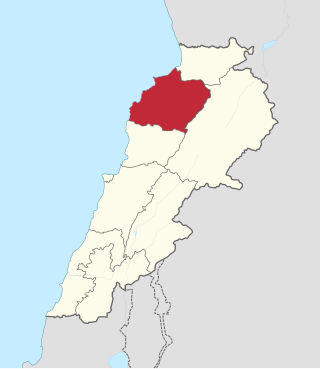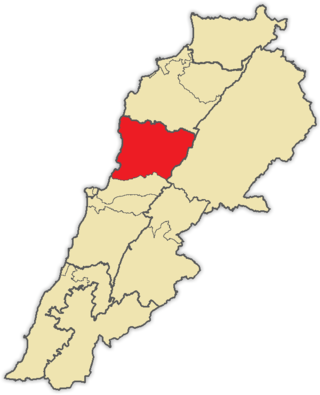
North Lebanon is the northern region of Lebanon comprising the North Governorate and Akkar Governorate. On 16 July 2003, the two entities were divided from the same province by former Prime Minister Rafik Hariri. The division was known as Law 522.

North Governorate is one of the governorates of Lebanon and one of the two governorates of North Lebanon. Its capital is Tripoli. Ramzi Nohra has been its governor since May 2, 2014. The population of North Governorate is 731,251.

General elections were held in Lebanon on 6 May 2018. Although originally scheduled for 2013, the election was postponed three times in 2013, 2014 and 2017 for various reasons, including the security situation, the failure of the Parliament to elect a new President, and the technical requirements of holding an election. A new electoral law adopted in 2017 provides a proportional representation system for the first time.

Beirut II is an electoral district in Beirut, Lebanon, as per the 2017 vote law. The district elects 11 members of the Lebanese National Assembly - 6 Sunnis, 2 Shias, 1 Druze, 1 Greek Orthodox, 1 Evangelical.

The Azm Movement is a political party in Lebanon, founded and led by Prime Minister of Lebanon Najib Miqati. It currently has no members in parliament after the 2022 Lebanese general election.

Bekaa I is an electoral district in Lebanon, as per the 2017 vote law. The district elects 2 Greek Catholic parliamentarians, 1 Maronite, 1 Greek Orthodox, 1 Armenian Orthodox, 1 Shia and 1 Sunni. The electoral district covers the qada of Zahle. The electoral district retained the geographic boundaries and seat allocation of the Zahle electoral district from the previous electoral law.
A total of 583 candidates contested the 2018 Lebanese general election, running on 77 lists.

Bekaa II is an electoral district in Lebanon, as per the 2017 vote law. The district elects 6 members of the Lebanese National Assembly - 2 Sunni, 1 Druze, 1 Greek Orthodox, 1 Maronite, 1 Shia. It covers the West Bekaa and the Rashaya districts.

Mount Lebanon I is an electoral district in Lebanon, as per the 2017 vote law. The district elects 8 members of the Lebanese National Assembly - 7 Maronites and 1 Shia. The constituency contains two 'minor districts', Byblos and Kesrwan. The Byblos 'minor district' elects 2 Maronite and 1 Shia parliamentarian, whilst the Kesrwan 'minor district' elects 5 Maronite parliamentarians.

Mount Lebanon IV is an electoral district in Lebanon, as per the 2017 vote law. The district elects 13 members of the Lebanese National Assembly - 5 Maronites, 4 Druze, 2 Sunni, 1 Greek Catholic and 1 Greek Orthodox. The constituency contains two 'minor districts', Aley and Chouf. The Aley 'minor district' elects 2 Druze, 2 Maronite and 1 Greek Orthodox parliamentarian, whilst the Chouf 'minor district' elects 3 Maronite, 2 Druze, 2 Sunni and 1 Greek Catholic parliamentarians.

North II is an electoral district in Lebanon, as per the 2017 vote law. The district elects 11 members of the Lebanese National Assembly - 8 Sunni, 1 Alawite, 1 Greek Orthodox and 1 Maronite. The constituency contains three 'minor districts', Tripoli, Miniyeh and Danniyeh. The Tripoli 'minor district' elects 5 Sunnis, 1 Alawite, 1 Greek Orthodox and 1 Maronite parliamentarian, the Miniyeh 'minor district' elects 1 Sunni and the Danniyeh 'minor district' elects 2 Sunni parliamentarians.

North III is an electoral district in Lebanon, as per the 2017 vote law. The district elects 10 members of the Lebanese National Assembly - 7 Maronites and 3 Greek Orthodox. The constituency contains four 'minor districts', Batroun, Bcharre, Koura and Zghorta.
A total of 718 candidates contested the 2022 Lebanese general election, running on 103 lists.

Voting to elect eight members of the Lebanese parliament took place in the Beirut I district on 6 May 2018, part of the general election of that year. The constituency had 134,355 (2018) registered voters, out of whom 43,353 voted.

Voting to elect eleven members of the Lebanese parliament took place in the Beirut II district on 6 May 2018, part of the general election of that year. The constituency had 353,164, out of whom 143,829 voted. Residents elect 6 Sunnis, 2 Shias, 1 Druze, 1 Greek Orthodox and 1 Evangelical.

Voting to elect seven members of the Lebanese parliament took place in the Bekaa I district on 6 May 2018, part of the general election of that year. The constituency had 172,555 voters, out of whom 94,082 voted. The district elects 2 Greek Catholic parliamentarians, 1 Maronite, 1 Greek Orthodox, 1 Armenian Orthodox, 1 Shia and 1 Sunni.
Voting to elect six members of the Lebanese parliament took place in the Bekaa II district on 6 May 2018, part of the general election of that year. The constituency had 143,653 who voted. The district elects 2 Sunni, 1 Druze, 1 Greek Orthodox, 1 Maronite, 1 Shia. It covers the West Bekaa and the Rashaya districts.

Voting to elect six members of the Lebanese parliament took place in the North I district on 6 May 2018, part of the general election of that year. The constituency had 137,550 who voted. The district elects 3 Sunni, 2 Greek Orthodox, 1 Maronite, 1 Alawite. It covers the Akkar district.

Voting to elect eleven members of the Lebanese parliament took place in the South III district on 6 May 2018, part of the general election of that year. The constituency had 460,565 voters, out of whom 228,563 voted. The district elects 8 Shiite parliamentarians, 1 Druze, 1 Greek Orthodox and 1 Sunni.

Voting to elect eight members of the Lebanese parliament took place in the Mount Lebanon I district on 6 May 2018, part of the general election of that year. The constituency had 176,818 registered voters, out of whom 115,619 voted.




















